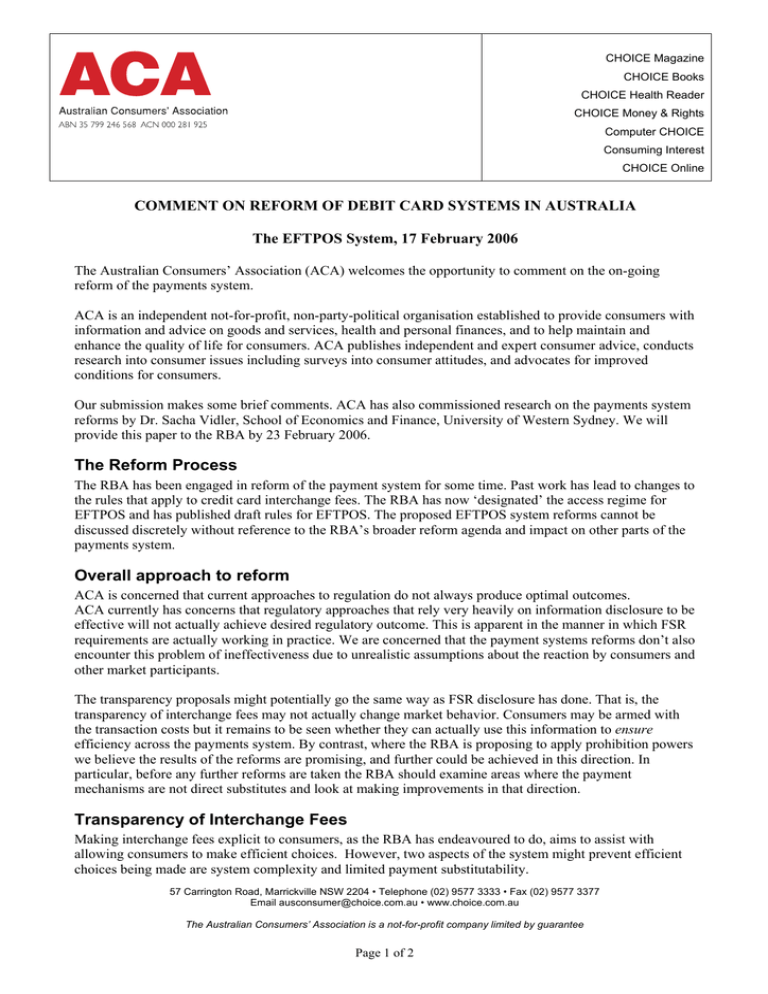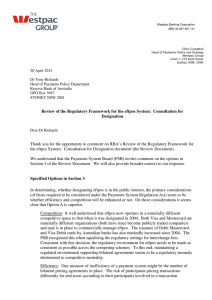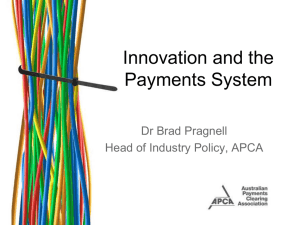Document 11073896
advertisement

CHOICE Magazine CHOICE Books CHOICE Health Reader CHOICE Money & Rights Computer CHOICE Consuming Interest CHOICE Online COMMENT ON REFORM OF DEBIT CARD SYSTEMS IN AUSTRALIA The EFTPOS System, 17 February 2006 The Australian Consumers’ Association (ACA) welcomes the opportunity to comment on the on-going reform of the payments system. ACA is an independent not-for-profit, non-party-political organisation established to provide consumers with information and advice on goods and services, health and personal finances, and to help maintain and enhance the quality of life for consumers. ACA publishes independent and expert consumer advice, conducts research into consumer issues including surveys into consumer attitudes, and advocates for improved conditions for consumers. Our submission makes some brief comments. ACA has also commissioned research on the payments system reforms by Dr. Sacha Vidler, School of Economics and Finance, University of Western Sydney. We will provide this paper to the RBA by 23 February 2006. The Reform Process The RBA has been engaged in reform of the payment system for some time. Past work has lead to changes to the rules that apply to credit card interchange fees. The RBA has now ‘designated’ the access regime for EFTPOS and has published draft rules for EFTPOS. The proposed EFTPOS system reforms cannot be discussed discretely without reference to the RBA’s broader reform agenda and impact on other parts of the payments system. Overall approach to reform ACA is concerned that current approaches to regulation do not always produce optimal outcomes. ACA currently has concerns that regulatory approaches that rely very heavily on information disclosure to be effective will not actually achieve desired regulatory outcome. This is apparent in the manner in which FSR requirements are actually working in practice. We are concerned that the payment systems reforms don’t also encounter this problem of ineffectiveness due to unrealistic assumptions about the reaction by consumers and other market participants. The transparency proposals might potentially go the same way as FSR disclosure has done. That is, the transparency of interchange fees may not actually change market behavior. Consumers may be armed with the transaction costs but it remains to be seen whether they can actually use this information to ensure efficiency across the payments system. By contrast, where the RBA is proposing to apply prohibition powers we believe the results of the reforms are promising, and further could be achieved in this direction. In particular, before any further reforms are taken the RBA should examine areas where the payment mechanisms are not direct substitutes and look at making improvements in that direction. Transparency of Interchange Fees Making interchange fees explicit to consumers, as the RBA has endeavoured to do, aims to assist with allowing consumers to make efficient choices. However, two aspects of the system might prevent efficient choices being made are system complexity and limited payment substitutability. 57 Carrington Road, Marrickville NSW 2204 • Telephone (02) 9577 3333 • Fax (02) 9577 3377 Email ausconsumer@choice.com.au • www.choice.com.au The Australian Consumers’ Association is a not-for-profit company limited by guarantee Page 1 of 2 The market for consumer payment services is complex. The idea that consumers could, if presented with discrete transaction costs, weigh up the costs and benefits of each payment mechanism in such a way that competitive pressure might influence the delivery of those services is unlikely. To make efficient choices at the margin, consumers would need to be abreast of a number of payment mechanisms characteristics and their own precise financial status, including knowing various account balances, numbers of transactions executed per month, and the value of loyalty program benefits and interest free periods. As behavioural economics clearly demonstrates, the assumption that consumers will use information optimally, in an economic sense, is wrong in a wide variety of non-trivial ways. Consumers display systematic biases and behaviours in decision making and information use that diverge significantly from the simple rational model. The issue of limited substitutability refers to those situations for which only one payment mechanism is viable, such as for ‘card not present’ transactions. These weaknesses in the payment system represent a weakness for the reform approach. It also means that competitive pressure to improve performance and efficiency may be slight. Further regulatory tools should be considered. Prohibition of anti-competitive behaviour To their credit, the RBA has displayed a willingness to take a more balanced approach to the regulatory toolkit in some areas by moving beyond approaches that simply rely on information provision. Importantly some of the reforms have moved to prohibit some behaviour between network participants. ACA welcomes these measures. These measures include: • abolish ‘honour all cards’ on the VISA system • abolish no-surcharge rule on VISA debit • the proposed cap on the EFTPOS fee charged to new entrants to the EFTPOS system • proposed rules on bilateral behaviour that frustrates new entrants accessing the EFTPOS system There also needs to be a focus needs to be on improving the substitutability of the payments system. In particular, person-to-person internet payments and the further development of electronic cash need to be encouraged. EFTPOS should also accommodate internet and telephone payments. Thankyou for the opportunity to comment. We will be providing a more comprehensive consultant’s report shortly. Dr. Nick Coates Senior Policy Officer. ≫57 Carrington Road, Marrickville NSW 2204 • Telephone (02) 9577 3333 • Fax (02) 9577 3377 Email ausconsumer@choice.com.au • www.choice.com.au The Australian Consumers’ Association is a not-for-profit company limited by guarantee. Page 2 of 2


